
23 Dec 2024
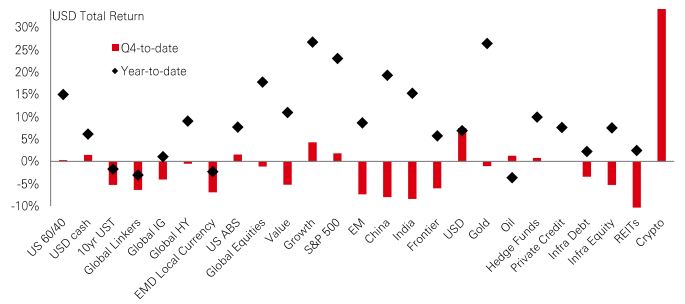
The story of investment markets in 2024 has been dominated by the course of disinflation and the global rate-cutting cycle. Last week’s sell-off in global stocks on a more hawkish Fed outlook showed how hyper-sensitive markets are to disappointing macro news. But Q4 has delivered some extra twists and turns, including the outcome of the US presidential election. The result raised uncertainty over future US policy, spurred strong moves in global risk assets, and drove a rally in the US dollar. It even got some credit for a surge in the price of cryptocurrencies.
In stocks, the strongest momentum has been in US large caps, especially in tech-related sectors. Despite last week’s moves, the S&P 500 is still up in Q4 (and up by more than 20%+ this year). Growth has thrived while value has lagged. But it was emerging market equities – which have been strong in 2024 – that felt the most pain in Q4 (see Page 2).
In fixed income, the potential for inflationary policy and higher-for-longer rates saw US Treasury yields rise. In credit, High Yield and ABS were more muted in Q4 (but have been strong in 2024 overall). Meanwhile in alternative assets, Q4 was weak but diversifiers like hedge funds, private credit, and real estate are on course to finish the year positively.
So, what comes next? We think that active fiscal policy, trade uncertainty, and geopolitical tensions may cause volatility and could leave investors ‘spinning around’ in 2025. And despite the moves in Q4, there is scope for performance to broaden out to developed markets beyond North America, as well as emerging and frontier markets next year (see Market Spotlight).
Overall market returns in 2024 are on track to be very solid. The good news for investors heading into next year is that global growth remains resilient, AI is driving revenue growth (and economic productivity), and central banks are still expected to cut rates. But could signs of inflation persistence force a more gradual easing path? This would pose obvious challenges to market performance, reflected in last week’s Fed-induced market wobble. The most expensive parts of the market (US tech) – which look priced for perfection – could be vulnerable, especially if profits disappoint.
If the US market starts to struggle, can other regions take the lead? Many markets outside of the US benefit from favourable valuations and improving profit growth. But for most EMs, a lot will depend on the course of the US dollar, the potency of China policy easing, and developments around trade policy. And for Europe, can the politics tilt in a more investor-friendly direction? Fiscal policy developments in France and Germany will be important.
Finally, could a pickup in market volatility support the performance of defensive sectors - healthcare, staples, utilities – that have lagged this year? With these sectors also acting as “bond proxies”, the direction of rates will also matter.
The value of investments and any income from them can go down as well as up and investors may not get back the amount originally invested. Past performance does not predict future returns. For informational purposes only and should not be construed as a recommendation to invest in the specific country, product, strategy, sector or security. Any views expressed were held at the time of preparation and are subject to change without notice. Any forecast, projection or target where provided is indicative only and is not guaranteed in any way.
Source: HSBC Asset Management. Macrobond, Bloomberg. Data as at 7.30am UK time 20 December 2024.
The Fed cut rates as expected at its December meeting but the FOMC’s revised projections unsettled markets. Upward revisions to inflation resulted in the removal of two rate cuts in 2025 – the Fed now expects to reduce the funds rate by 0.5% next year, rather than 1%. Chair Powell noted that following a sticky patch in recent months, evidence that inflation was again moving towards target would be needed before the Fed sanctions another cut. A pause in early 2025 looks likely.
Treasury yields jumped by over 0.1% and the USD hit its highest level since 2022 as markets moved to price in a slower pace of policy easing. But the biggest move came in equities – the S&P 500 fell 3% on the day.
The market is now pricing in a very shallow slope for policy easing – only 1-2 cuts in 2025. Combined with significant Treasury issuance, this has pushed the 10yr yield back above 4.50%. This maintains a solid income component for fixed income investors. And on a cyclical basis, if inflation were to decline more quickly than expected – possible given its hitherto bumpy path – or growth disappoints, Treasury yields could fall back.
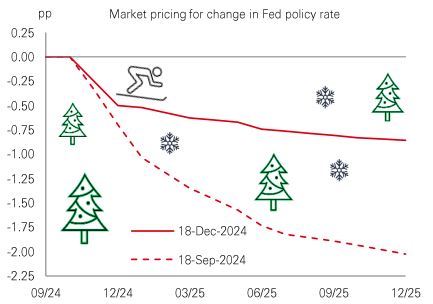
Stock markets in emerging and frontier economies have delivered a broadly positive performance in 2024 – but Q4 has been difficult.
In part, recent weakness is down to the headwind of a resurgent US dollar, which has rallied since early October. Concerns over higher-for-longer US rates and heightened trade tensions have added to the woes. These factors have complicated an already challenging domestic backdrop for Latam countries like Brazil. And together with a weak profits outlook, that led to a big decline for the region’s stocks in Q4.
Policy uncertainty has also dragged on markets in EM ASEAN, where financial stocks (which have a high weighting in regional indices) have weakened. Mainland Chinese stocks have also lost ground in Q4. But year-to-date, mainland China, together with Taiwan and India, remains among the strongest EM performers this year. Even excluding mainland China, the benefit of idiosyncratic trends and strong structural growth stories have helped broader EM, Asia, and Frontier stock universes to perform well in 2024.
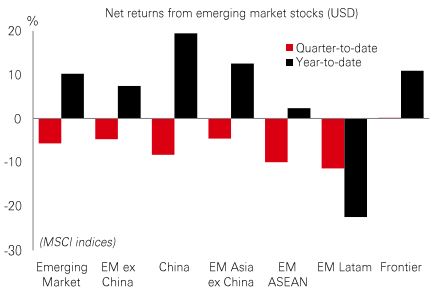
In recent weeks, China’s longer-dated government bond yields have fallen below those of Japan, in a historic shift that reflects significant developments in both economies.
The global inflation shock boosted Japanese nominal GDP and appears to have triggered a “virtuous cycle” in wages and prices. While the BoJ opted not to hike at its December meeting, markets expect 0.4%-0.5% of tightening in 2025. This move away from deflation, the expectation of gradual policy normalisation, and higher US Treasury yields, have combined to push longer-dated Japanese yields higher.
In contrast, Chinese bond yields have trended lower since the pandemic, reflecting a period of weak inflation, lingering growth concerns, and ongoing PBOC easing expectations. December’s Politburo meeting called for “moderately loose” monetary policy, pointing to further rate cuts.
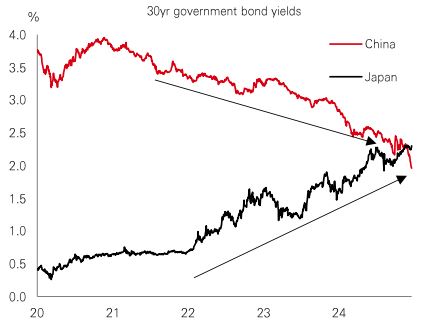
Past performance does not predict future returns. The level of yield is not guaranteed and may rise or fall in the future. For informational purposes only and should not be construed as a recommendation to invest in the specific country, product, strategy, sector or security. Any views expressed were held at the time of preparation and are subject to change without notice. Index returns assume reinvestment of all distributions and do not reflect fees or expenses. You cannot invest directly in an index. Any forecast, projection or target where provided is indicative only and not guaranteed in any way. Diversification does not ensure a profit or protect against loss. Source: HSBC Asset Management. Macrobond, Bloomberg, Datastream. Data as at 7.30am UK time 20 December 2024.
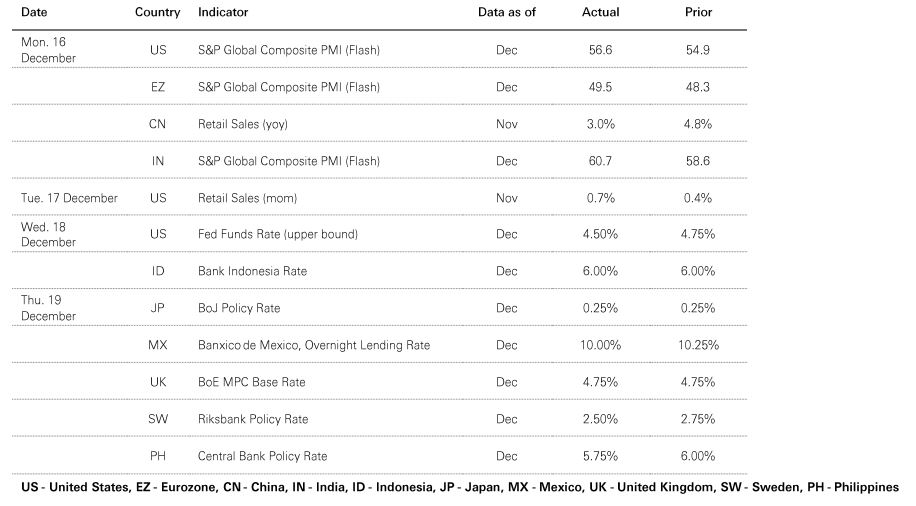
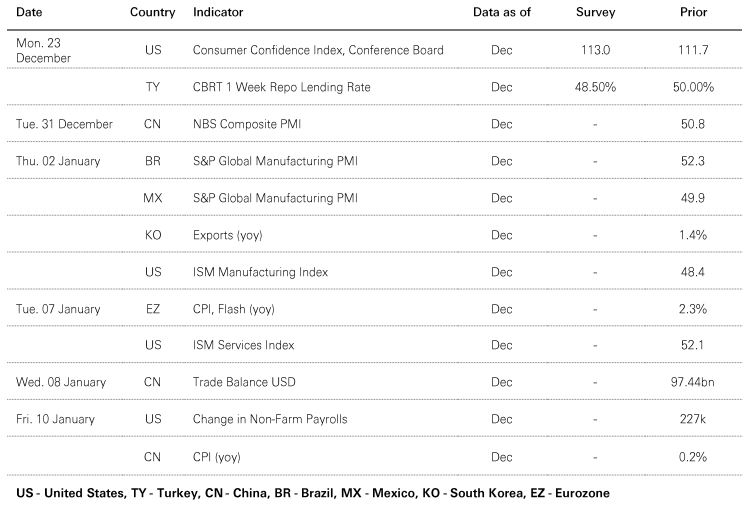
Source: HSBC Asset Management. Data as at 7.30am UK time 23 December 2024. For informational purposes only and should not be construed as a recommendation to invest in the specific country, product, strategy, sector or security. Any views expressed were held at the time of preparation and are subject to change without notice.
The US Fed lowered rates by 0.25% last week, but a more hawkish outlook from the FOMC caused a spike in market volatility, with government bond yields moving higher and risk assets selling off. US 10yr Treasuries jumped above 4.5% – their highest level since May – in response to revised rate expectations, with the US dollar also rallying against a basket of major currencies. In stocks, the S&P 500 led global indices lower mid-week, with the small-cap Russell 2000 falling sharply, and Europe’s Stoxx 600 index also losing ground. In emerging markets, China’s Shanghai Composite withstood the worst of the volatility with only modest declines, while India’s Sensex, Brazil’s Bovespa and Mexico’s IPC all saw sharper losses. In commodities, the WTI oil price was down modestly through last week, while gold and copper prices also fell.






This document or video is prepared by The Hongkong and Shanghai Banking Corporation Limited (‘HBAP’), 1 Queen’s Road Central, Hong Kong. HBAP is incorporated in Hong Kong and is part of the HSBC Group. This document or video is distributed and/or made available, HSBC Bank (China) Company Limited, HSBC Bank (Singapore) Limited, HSBC Bank Middle East Limited (UAE), HSBC UK Bank Plc, HSBC Bank Malaysia Berhad (198401015221 (127776-V))/HSBC Amanah Malaysia Berhad (20080100642 1 (807705-X)), HSBC Bank (Taiwan) Limited, HSBC Bank plc, Jersey Branch, HSBC Bank plc, Guernsey Branch, HSBC Bank plc in the Isle of Man, HSBC Continental Europe, Greece, The Hongkong and Shanghai Banking Corporation Limited, India (HSBC India), HSBC Bank (Vietnam) Limited, PT Bank HSBC Indonesia (HBID), HSBC Bank (Uruguay) S.A. (HSBC Uruguay is authorised and oversought by Banco Central del Uruguay), HBAP Sri Lanka Branch, The Hongkong and Shanghai Banking Corporation Limited – Philippine Branch, HSBC Investment and Insurance Brokerage, Philippines Inc, and HSBC FinTech Services (Shanghai) Company Limited and HSBC Mexico, S.A. Multiple Banking Institution HSBC Financial Group (collectively, the “Distributors”) to their respective clients. This document or video is for general circulation and information purposes only.
The contents of this document or video may not be reproduced or further distributed to any person or entity, whether in whole or in part, for any purpose. This document or video must not be distributed in any jurisdiction where its distribution is unlawful. All non-authorised reproduction or use of this document or video will be the responsibility of the user and may lead to legal proceedings. The material contained in this document or video is for general information purposes only and does not constitute investment research or advice or a recommendation to buy or sell investments. Some of the statements contained in this document or video may be considered forward looking statements which provide current expectations or forecasts of future events. Such forward looking statements are not guarantees of future performance or events and involve risks and uncertainties. Actual results may differ materially from those described in such forward-looking statements as a result of various factors. HBAP and the Distributors do not undertake any obligation to update the forward-looking statements contained herein, or to update the reasons why actual results could differ from those projected in the forward-looking statements. This document or video has no contractual value and is not by any means intended as a solicitation, nor a recommendation for the purchase or sale of any financial instrument in any jurisdiction in which such an offer is not lawful. The views and opinions expressed are based on the HSBC Global Investment Committee at the time of preparation and are subject to change at any time. These views may not necessarily indicate HSBC Asset Management‘s current portfolios’ composition. Individual portfolios managed by HSBC Asset Management primarily reflect individual clients’ objectives, risk preferences, time horizon, and market liquidity.
The value of investments and the income from them can go down as well as up and investors may not get back the amount originally invested. Past performance contained in this document or video is not a reliable indicator of future performance whilst any forecasts, projections and simulations contained herein should not be relied upon as an indication of future results. Where overseas investments are held the rate of currency exchange may cause the value of such investments to go down as well as up. Investments in emerging markets are by their nature higher risk and potentially more volatile than those inherent in some established markets. Economies in emerging markets generally are heavily dependent upon international trade and, accordingly, have been and may continue to be affected adversely by trade barriers, exchange controls, managed adjustments in relative currency values and other protectionist measures imposed or negotiated by the countries with which they trade. These economies also have been and may continue to be affected adversely by economic conditions in the countries in which they trade. Investments are subject to market risks, read all investment related documents carefully.
This document or video provides a high-level overview of the recent economic environment and has been prepared for information purposes only. The views presented are those of HBAP and are based on HBAP’s global views and may not necessarily align with the Distributors’ local views. It has not been prepared in accordance with legal requirements designed to promote the independence of investment research and is not subject to any prohibition on dealing ahead of its dissemination. It is not intended to provide and should not be relied on for accounting, legal or tax advice. Before you make any investment decision, you may wish to consult an independent financial adviser. In the event that you choose not to seek advice from a financial adviser, you should carefully consider whether the investment product is suitable for you. You are advised to obtain appropriate professional advice where necessary.
The accuracy and/or completeness of any third-party information obtained from sources which we believe to be reliable might have not been independently verified, hence Customer must seek from several sources prior to making investment decision.
The following statement is only applicable to HSBC Mexico, S.A. Multiple Banking Institution HSBC Financial Group with regard to how the publication is distributed to its customers: This publication is distributed by Wealth Insights of HSBC México, and its objective is for informational purposes only and should not be interpreted as an offer or invitation to buy or sell any security related to financial instruments, investments or other financial product. This communication is not intended to contain an exhaustive description of the considerations that may be important in making a decision to make any change and/or modification to any product, and what is contained or reflected in this report does not constitute, and is not intended to constitute, nor should it be construed as advice, investment advice or a recommendation, offer or solicitation to buy or sell any service, product, security, merchandise, currency or any other asset.
Receiving parties should not consider this document as a substitute for their own judgment. The past performance of the securities or financial instruments mentioned herein is not necessarily indicative of future results. All information, as well as prices indicated, are subject to change without prior notice; Wealth Insights of HSBC Mexico is not obliged to update or keep it current or to give any notification in the event that the information presented here undergoes any update or change. The securities and investment products described herein may not be suitable for sale in all jurisdictions or may not be suitable for some categories of investors.
The information contained in this communication is derived from a variety of sources deemed reliable; however, its accuracy or completeness cannot be guaranteed. HSBC México will not be responsible for any loss or damage of any kind that may arise from transmission errors, inaccuracies, omissions, changes in market factors or conditions, or any other circumstance beyond the control of HSBC. Different HSBC legal entities may carry out distribution of Wealth Insights internationally in accordance with local regulatory requirements.
Important Information about the Hongkong and Shanghai Banking Corporation Limited, India (“HSBC India”)
HSBC India is a branch of The Hongkong and Shanghai Banking Corporation Limited. HSBC India is a distributor of mutual funds and referrer of investment products from third party entities registered and regulated in India. HSBC India does not distribute investment products to those persons who are either the citizens or residents of United States of America (USA), Canada, Australia or New Zealand or any other jurisdiction where such distribution would be contrary to law or regulation.
The following statement is only applicable to HSBC Bank (Taiwan) Limited with regard to how the publication is distributed to its customers: HSBC Bank (Taiwan) Limited (“the Bank”) shall fulfill the fiduciary duty act as a reasonable person once in exercising offering/conducting ordinary care in offering trust services/ business. However, the Bank disclaims any guarantee on the management or operation performance of the trust business.
The following statement is only applicable to PT Bank HSBC Indonesia (“HBID”): PT Bank HSBC Indonesia (“HBID”) is licensed and supervised by Indonesia Financial Services Authority (“OJK”). Customer must understand that historical performance does not guarantee future performance. Investment product that are offered in HBID is third party products, HBID is a selling agent for third party product such as Mutual Fund and Bonds. HBID and HSBC Group (HSBC Holdings Plc and its subsidiaries and associates company or any of its branches) does not guarantee the underlying investment, principal or return on customer investment. Investment in Mutual Funds and Bonds is not covered by the deposit insurance program of the Indonesian Deposit Insurance Corporation (LPS).
Important information on ESG and sustainable investing
Today we finance a number of industries that significantly contribute to greenhouse gas emissions. We have a strategy to help our customers to reduce their emissions and to reduce our own. For more information visit www.hsbc.com/sustainability.
In broad terms “ESG and sustainable investing” products include investment approaches or instruments which consider environmental, social, governance and/or other sustainability factors to varying degrees. Certain instruments we classify as sustainable may be in the process of changing to deliver sustainability outcomes. There is no guarantee that ESG and Sustainable investing products will produce returns similar to those which don’t consider these factors. ESG and Sustainable investing products may diverge from traditional market benchmarks. In addition, there is no standard definition of, or measurement criteria for, ESG and Sustainable investing or the impact of ESG and Sustainable investing products. ESG and Sustainable investing and related impact measurement criteria are (a) highly subjective and (b) may vary significantly across and within sectors.
HSBC may rely on measurement criteria devised and reported by third party providers or issuers. HSBC does not always conduct its own specific due diligence in relation to measurement criteria. There is no guarantee: (a) that the nature of the ESG / sustainability impact or measurement criteria of an investment will be aligned with any particular investor’s sustainability goals; or (b) that the stated level or target level of ESG / sustainability impact will be achieved. ESG and Sustainable investing is an evolving area and new regulations are being developed which will affect how investments can be categorised or labelled. An investment which is considered to fulfil sustainable criteria today may not meet those criteria at some point in the future.
THE CONTENTS OF THIS DOCUMENT OR VIDEO HAVE NOT BEEN REVIEWED BY ANY REGULATORY AUTHORITY IN HONG KONG OR ANY OTHER JURISDICTION. YOU ARE ADVISED TO EXERCISE CAUTION IN RELATION TO THE INVESTMENT AND THIS DOCUMENT OR VIDEO. IF YOU ARE IN DOUBT ABOUT ANY OF THE CONTENTS OF THIS DOCUMENT OR VIDEO, YOU SHOULD OBTAIN INDEPENDENT PROFESSIONAL ADVICE.
© Copyright 2024. The Hongkong and Shanghai Banking Corporation Limited, ALL RIGHTS RESERVED.
No part of this document or video may be reproduced, stored in a retrieval system, or transmitted, on any form or by any means, electronic, mechanical, photocopying, recording or otherwise, without the prior written permission of The Hongkong and Shanghai Banking Corporation Limited.